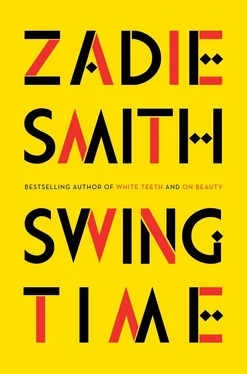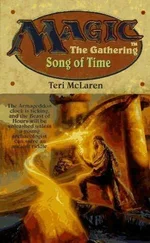Six
I didn’t know that Tracey’s father had gone to prison. It was my mother who told me, a few months after the fact: “I see he’s gone in again.” She didn’t have to say more, or tell me to spend less time with Tracey, it was happening naturally anyway. A cooling-off: one of those things that can happen between girls. At first I was distraught, thinking it permanent, but in fact it was only a hiatus, one of many we would have, lasting a couple of months, sometimes longer, but always ending — not coincidentally — with her father getting out again, or else returning from Jamaica, where he often had to flee, when things got hot for him in the neighborhood. It was as if, when he was “in,” or away, Tracey went into standby mode, pausing herself like a video-tape. Although in class we no longer shared a desk (we had been separated after Lily’s party, my mother went up to the school and requested it) I had a clear view of her each day and when there was “trouble at home” I sensed it at once, it revealed itself in everything she did, or didn’t do. She made life as difficult as possible for our teacher, not with explicit bad behavior like the rest of us, not by swearing or fighting, but by an absolute withdrawal of her presence. Her body was there, nothing else. She wouldn’t answer questions or ask them, didn’t involve herself in any activities or copy anything down, or even open her exercise book, and I understood, at such times, that for Tracey time had stopped. If Mr. Sherman started shouting she sat impassive at her desk, her eyes angled to a point above his head, her noise upturned, and nothing he could say — no threat and no degree of volume — had any effect. As I’d predicted, she never did forget those Garbage Pail Kids cards. And being sent to the headmistress’s office held no fear for her: she stood up in the coat she had anyway never taken off and walked out of the room as if it made no difference where she went or what happened to her. When she was in this state of mind I took the opportunity to do those things that, when I was with Tracey, I felt inhibited from doing. I spent more time with Lily Bingham, for example, taking pleasure in her good humor and gentle way of being: she still played with dolls, knew nothing of sex, loved drawing and making things out of cardboard and glue. In other words she was still a child, as I sometimes wished I could be. In her games nobody died or was afraid or took revenge or feared being uncovered as a fraud, and there was absolutely no black and no white, for, as she solemnly explained to me one day as we played, she herself was “color blind” and saw only what was in a person’s heart. She had a little cardboard theater of the Russian Ballet, bought in Covent Garden, and for her a perfect afternoon involved maneuvering the cardboard prince around the stage, letting him meet a cardboard princess and fall in love with her, while a scratchy copy of Swan Lake , her father’s, played in the background. She loved ballet, though she was a poor dancer herself, too bandy-legged to have any real hopes, and she knew all the French words for everything, and the tragic life stories of Diaghilev and Pavlova. Tap dancing didn’t interest her. When I showed her my well-worn copy of Stormy Weather she reacted in a way I hadn’t anticipated, she was offended by it — hurt, even. Why was everybody black? It was unkind, she said, to have only black people in a film, it wasn’t fair. Maybe in America you could do that, but not here, in England, where everybody was equal anyway and there was no need to “go on about it.” And we wouldn’t like it, she said, if someone said to us that only black people could come to Isabel’s dance class, that wouldn’t be nice or fair to us, would it? We’d be sad about that. Or that only black people could come into our school. We wouldn’t like that, would we? I said nothing. I put Stormy Weather back in my rucksack and went home, walking beneath a Willesden sunset of petroleum colors and quick-shunting clouds, going over and over this curious lecture in my mind, wondering what she could have meant by the word “we”?
Seven
When things were frosty between Tracey and me I found Saturdays hard, and relied on Mr. Booth for conversation and advice. I brought new information to him — which I got from the library — and he added to what I had or explained things I didn’t understand. Mr. Booth hadn’t known, for example, that it was not really “Fred Astaire” but “Frederick Austerlitz,” but he understood what “Austerlitz” meant, he explained it was a name that must have come not from America but from Europe, probably German or Austrian, possibly Jewish. To me Astaire was America — if he had been on the flag I would not have been surprised — but now I learned that he’d spent a lot of time in London, in fact, and that he had become famous here, dancing with his sister, and if I’d been born sixty years earlier I could have gone to the Shaftesbury Theater and seen him myself. And what’s more, said Mr. Booth, his sister was a far better dancer than him, everybody said so, she was the star and he was the also-ran, can’t sing, can’t act, balding, can dance, a little , ha ha ha, well he showed them, didn’t he? Listening to Mr. Booth, I wondered if it were possible for me, too, to become a person who revealed themselves later in life, much later, so that one day — a long time from now — it would be Tracey sitting in the front row of the Shaftesbury Theater, watching me dance, our positions reversed completely, my own superiority finally recognized by the world. And in later years, said Mr. Booth, taking my library book out of my hands and reading from it, in later years his daily routine was little changed from the life he had always led. He woke up at five a.m. and breakfasted on a single boiled egg that kept his weight at a constant hundred and thirty-four pounds. Addicted to television serials such as The Guiding Light and As the World Turns , he would telephone his housekeeper if he could not watch the soap operas, to find out what had happened. Mr. Booth closed the book, smiled and said: “What an odd fish!”
When I complained to Mr. Booth of Astaire’s one imperfection — that he couldn’t, in my opinion, sing — I was wrong-footed by how strongly he disagreed, usually we agreed about everything, and were always laughing together, but now he picked out the notes to “All of Me” in a minimal sort of way on the piano and said: “But singing isn’t just about belting it out, is it? It’s not just who has the most wobble or the highest note, no, it’s about phrasing, and being delicate, and getting just the right feeling from a song, the soul of it, so that something real happens inside you when a man opens his mouth to sing, and don’t you want to feel something real rather than just having your poor earholes bashed in?”
He stopped talking and played “All of Me” in full, and I sang along with him, consciously trying to deliver each phrase in the same manner that Astaire does in Silk Stockings —cutting some lines short, half speaking others — though it didn’t feel natural to me. Together Mr. Booth and I considered what it would be like to love the east, west, north and south of somebody, to gain complete control of them, even if they loved, in return, only a small percentage of us. Usually I performed with one hand on the piano, facing out, because that’s how the girls did it in the movies, and that way I could keep an eye on the clock over the church door and know when the last child had filed in and therefore when it was time to stop, but on this occasion the desire to try to sing in harmony with that delicate melody — to match Mr. Booth’s way of playing it, not just to “belt it out” but to create a real feeling — made me instinctively turn inwards, halfway through the verse, and when I did I saw that Mr. Booth was crying, very softly, but certainly crying. I stopped singing. “And he’s trying to make her dance,” he said. “Fred wants Cyd to dance, but she won’t, will she? She’s what you’d call an intellectual, from Russia, and she don’t want to dance, and she says to him: ‘The trouble with dancing is You go, go, go, but you don’t get anywhere! ’ And Fred says: ‘ You’re telling me! ’ Lovely. Lovely! Now look, dear, it’s time for class. You’d best get your shoes on.”
Читать дальше












